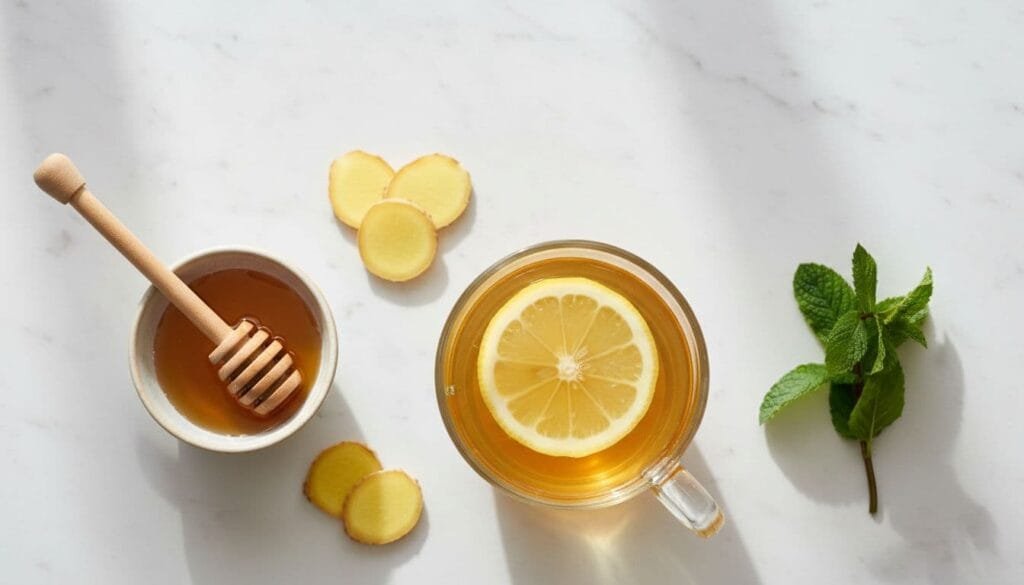10 Lemon Ginger Tea Health Benefits & Simple Brewing Tips
Warm, bright, and a little spicy, this simple drink has become a true staple in my kitchen. It uses two fresh ingredients most of us already have, and it fits right into a low-tox, family-first routine.
- All About Lemon Ginger Tea and Why It Belongs in a Low-Tox Kitchen
- 10 Lemon Ginger Tea Health Benefits You Can Feel
- The Best Way to Brew Lemon Ginger Tea at Home
- When to Drink It, Safety, and Who Should Skip It
- Frequently Asked Questions
- Is lemon ginger tea caffeine-free?
- Can I use powdered ginger instead of fresh?
- Do I add lemon while simmering?
- How much should I drink each day?
- Is it safe during pregnancy?
- Will it help with a sore throat?
- What if I have reflux?
- Can kids drink it?
- Can I make it iced?
- How long does it keep in the fridge?
- Does it stain teeth or affect enamel?
- Can I sweeten it without sugar?
- What add-ins pair well without overpowering?
- Can I reheat leftovers?
- Any medication concerns?
- Can I use lemon peel or zest?
- Wrap-Up
If you want a calm, healthy habit that is caffeine-free, budget-friendly, and quick to make, lemon ginger tea checks all those boxes. In this guide, you’ll find the top 10 lemon ginger tea health benefits and a foolproof way to brew it so it tastes great every time.
I make a small pot in the morning when the house is still quiet. Small daily habits like this can anchor a day with purpose. A quick note: tea supports wellness; it does not replace medical care. Always check with your provider if you have questions.
Primary keyword to know: lemon ginger tea health benefits.
All About Lemon Ginger Tea and Why It Belongs in a Low-Tox Kitchen
Lemon ginger tea is an herbal infusion. That means it is made by steeping fresh ginger and lemon in hot water. It is not a true tea from the tea plant, so it is naturally caffeine-free.
The flavor is bright, zesty, and lightly spicy, yet soothing. Fresh ginger holds warming compounds like gingerol. Lemon brings vitamin C and fragrant oils in the peel. Together, they taste clean and comforting.
Fresh ingredients matter. I scrub the ginger well and slice it thin to expose more surface area. If the ginger is organic, I don’t bother peeling. For lemons, wash them well. If you plan to use zest, consider organic when you can.
This drink fits a low-tox lifestyle because it is simple, made from whole foods, and easy to customize without artificial flavors. Kids usually like a milder brew with a little honey. Adults can make a stronger concentrate and dilute it throughout the day.
Key takeaway: Keep it simple, use fresh ginger and lemon, and add lemon after heating for the best flavor and nutrients.
10 Lemon Ginger Tea Health Benefits You Can Feel
There is a reason this combo shows up in both traditional kitchens and modern research. Ginger and lemon are loaded with antioxidants and supportive compounds. One cup a day can be a steady, helpful habit.
1. Stronger Immune Support During Cold Season
- Simple science: Lemons offer vitamin C that supports immune function, and ginger contains natural compounds that help the body respond to germs.
- Practical tip: Add lemon after heating to protect vitamin C, and sip warm at the first sign of a scratchy throat.
- Family angle: Make a cozy pot for the whole family when sniffles start.
- Gentle note: Tea supports your immune system. If you’re trying to treat an illness, reach out to a healthcare professional.
2. Settles Nausea and Aids Digestion
- What it does: Ginger is known to ease nausea and indigestion, including motion sickness and occasional morning queasiness.
- Practical tip: Sip small amounts 15 to 30 minutes before travel or after a heavy meal.
- Add-ins: A little honey can be soothing on the stomach.
- Caution: If reflux flares with lemon, reduce lemon juice or skip the zest.
3. Calms Inflammation and Everyday Aches
- What it does: Ginger and lemon provide antioxidants that help the body manage everyday inflammation.
- Practical tip: Brew a slightly stronger cup, then add a pinch of turmeric and a crack of black pepper for extra support.
- Lifestyle note: Pair your tea with short daily walks and gentle stretching.
4. Supports Heart Health and Healthy Cholesterol
- What it does: Ginger may help maintain healthy blood lipids and normal circulation; lemon brings protective antioxidants.
- Practical tip: Enjoy a cup with meals rich in fiber and healthy fats.
- Caution: If you take blood thinners, talk with your doctor before drinking strong ginger tea regularly.
5. Helps With Weight Management Habits
- What it does: Ginger can promote a feeling of fullness and support a healthy metabolism; lemon adds flavor without sugar, which helps with hydration.
- Practical tip: Sip before meals to help avoid overeating, and keep it unsweetened or lightly sweetened.
- Encourage: Tea is a helper; steady sleep, real food, and daily movement do the heavy lifting.
6. Clearer Skin and Natural Collagen Support
- What it does: Vitamin C helps your body build collagen for firm, bright skin; ginger’s calming compounds may reduce redness.
- Practical tip: Add lemon after the heat is off, and drink with a protein-rich snack to support collagen building.
- Hydration note: Swapping soda for this tea can support clearer skin.
For more ways to simplify your body care at home, try these homemade bath powder recipes.
7. Sharper Focus and Gentle Energy
- What it does: Ginger may support healthy blood flow, while lemon’s scent can lift mood and alertness.
- Practical tip: Enjoy a warm cup in the late morning for a calm focus boost without caffeine jitters.
- Habit cue: Pair with a quiet 5-minute break to reset your day.
8. Eases Daily Stress With a Comforting Ritual
- What it does: The bright aroma of lemon and the warmth of ginger can help the body relax and reset.
- Practical tip: Hold the mug close and take three slow breaths before the first sip.
- Evening twist: Make it mild and unsweetened before bed.
9. Gentle Detox Support for Liver and Gut
- What it does: Lemon supports normal liver function, and ginger can promote digestive movement, which helps the body do its daily cleanup work.
- Practical tip: Drink warm water first thing in the morning, then follow with water throughout the day.
- Clarity: Detox means supporting normal body processes, not a harsh cleanse.
10. Antioxidant Protection for Long-Term Health
- What it does: Both ingredients provide antioxidants that protect cells from everyday stress.
- Practical tip: Pair your tea with colorful produce to stack antioxidant benefits.
- Balance: Promising lab research exists, but whole lifestyle patterns matter most.
Key takeaway: Let this tea be part of a simple routine that highlights whole foods, movement, and rest.
Love This Simple Wellness Habit?
This one tea DIY is a perfect start. If you’re ready to bring more simple, non-toxic DIYs into other areas of your life, my Natural Living Handbook is your next step.
It’s packed with 60+ simple recipes for all-natural skincare, cleaning, laundry, haircare, and more. Get it with the Finally in Control Planner in the Natural Living & Organization Bundle to help you plan and simplify your entire natural-living journey.
Love natural scents and want to add more variety to your life? You might enjoy these easy essential oil perfume recipes.
The Best Way to Brew Lemon Ginger Tea at Home
Getting the method right makes a big difference. The goal is strong ginger flavor, a soft lemon lift, and nutrients kept intact by smart timing.
Ingredients and Simple Ratios
- Per 1 serving: 1 cup water (240 ml), 10 to 15 g fresh ginger (about a 1 to 1.5 inch piece), 1 to 2 tablespoons fresh lemon juice, and optional 1 to 2 teaspoons honey.
- For a small pot (4 cups): 4 cups water, 40 to 60 g ginger, juice of 1 to 2 lemons, sweeten to taste.
- Swaps: 1 teaspoon dried ginger or 1 tea bag can replace fresh in a pinch, but fresh tastes brighter. Add a few lemon slices or a little zest for aroma.
Step-by-Step Brewing Method
- Slice the ginger thinly. Bring water to a gentle simmer.
- Add ginger, simmer 8 to 10 minutes for a mild cup, 12 to 15 minutes for a stronger cup. Keep the pot covered.
- Turn off the heat. Add lemon juice and optional zest. Cover and steep 2 to 3 minutes.
- Strain, taste, and add honey if you like.
Tip: add lemon after simmering to protect flavor and vitamin C. Aim for about 200°F water, just off a boil.
Flavor Upgrades and Wellness Add-Ins
- Cozy options: a cinnamon stick, a few mint leaves, or a slice of fresh turmeric.
- For extra warmth: a tiny pinch of cayenne.
- For creamy comfort: a splash of coconut milk.
- Keep add-ins light so ginger and lemon remain the stars.
Iced, Concentrate, and Make-Ahead Tips
- Brew a double-strength pot, cool, then store in the fridge up to 3 days. Dilute with cold water and ice when serving.
- Freeze leftover concentrate in ice cube trays for quick cups.
- For iced tea, sweeten while warm so the honey dissolves, then chill.
Sweeteners and Kid-Friendly Sips
- Start unsweetened, then add 1 tsp honey or maple to taste.
- For kids, brew mild, add extra water, and a thin lemon slice for fun.
- If watching sugar, use no-calorie options or enjoy it plain.
Key takeaway: Simmer ginger, add lemon off the heat, and keep flavors balanced. Simple steps, great results.
When to Drink It, Safety, and Who Should Skip It

A little guidance helps you make this a safe, steady habit for your home.
Best Times to Drink and How Much
- Great moments: first thing in the morning for gentle digestion, after meals to settle the stomach, late afternoon for calm focus, or a mild cup in the evening.
- Typical amount: 1 to 2 cups daily for most adults, up to 3 if well tolerated.
- Ginger guide: food level intake is usually 1 to 3 grams daily; in pregnancy, limit total ginger to about 1 gram per day unless your provider advises otherwise.
Medication and Health Cautions
- Talk to your doctor if you take blood thinners, have gallstones, ulcers, GERD, or a bleeding disorder.
- Ginger may interact with blood thinners. Lemon acid can cause reflux.
- If you have diabetes, account for added sweeteners.
- Stop if you notice a rash, burning, or stomach pain.
Possible Side Effects and How to Avoid Them
- Too strong a brew can cause heartburn or stomach upset. Dilute or shorten the simmer time.
- Citrus can irritate sensitive teeth; rinse with water after a cup.
- If pregnant or nursing, choose a mild brew and confirm amounts with your provider.
Storage and Food Safety
- Refrigerate leftover tea within 2 hours, drink within 3 days.
- Store lemon and ginger whole in the fridge; slice fresh for the best flavor.
- Use clean tools and covered containers to keep flavors fresh.
Key takeaway: Keep portions modest, watch for interactions, and store safely.
Frequently Asked Questions
Is lemon ginger tea caffeine-free?
Yes. It is an herbal infusion, so there is no caffeine.
Can I use powdered ginger instead of fresh?
Yes. Use 1 teaspoon of powdered ginger per cup. The flavor is a bit different. I’d say it’s a bit spicier and less bright tasting, but it works well.
Do I add lemon while simmering?
Add lemon after you turn off the heat. It protects flavor and vitamin C.
How much should I drink each day?
Most adults do well with 1 to 2 cups. Go up to 3 if it feels good.
Is it safe during pregnancy?
Keep ginger to about 1 gram daily unless your provider advises more. Make a mild brew and skip the zest if sensitive. Check with your doctor.
Will it help with a sore throat?
Warm tea can feel soothing. Add honey if you like. It supports comfort, not treatment.
What if I have reflux?
Brew it mild, use less lemon, and avoid zest. Stop if it burns.
Can kids drink it?
Yes, in mild form. Dilute with water and add a thin lemon slice.
Can I make it iced?
Yes. Brew double-strength, chill, then dilute with cold water and ice.
How long does it keep in the fridge?
Up to 3 days in a covered container. Refrigerate within 2 hours.
Does it stain teeth or affect enamel?
Citrus acid can bother enamel. Rinse with plain water after a cup.
Can I sweeten it without sugar?
Yes. Try stevia or drink it plain. Start unsweetened, then adjust.
What add-ins pair well without overpowering?
Fresh mint, a cinnamon stick, turmeric, or a tiny pinch of cayenne.
Can I reheat leftovers?
Yes. Warm gently on the stove. Add fresh lemon after reheating for the best taste.
Any medication concerns?
If you take blood thinners or have gallstones, talk with your doctor first. Stop if you notice irritation.
Can I use lemon peel or zest?
Yes, for aroma. Use a small amount to avoid bitterness. Add off heat.
Wrap-Up
Lemon ginger tea supports immune health, digestion, calm joints, clear skin, steady focus, daily stress relief, heart health, gentle detox pathways, weight management habits, and long-term antioxidant protection. That is a lot of good from two simple ingredients.
The method is easy. Simmer ginger, add lemon off heat, then sip warm. Try one cup a day for a week and notice changes in digestion, focus, and calm. Choose add-ins you enjoy, and listen to your body. Steady, simple habits often bring the biggest wins, and this tea is a small habit with a big impact.



